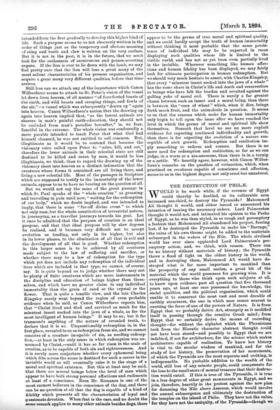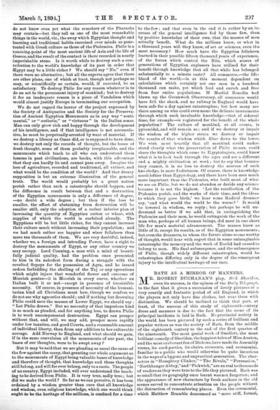THE DESTRUCTION OF PHIL/E.
WOULD it be worth while, if the revenue of Egypt could thereby be doubled, or its cultnrable area increased one-third, to destroy the Pyramids ? Mahommed Ali thought it would, and either issued or announced his intention of issuing the necessary orders. Lord Palmerston thought it would not, and intimated his opinion to the Pasha of Egypt, as he was then styled, in so rough and peremptory a fashion that Mahommed Ali abandoned his project, fearing lest, if he destroyed the Pyramids to make his "Barrage," the ruins of his own throne might be added to the materials submerged in the waters of the Nile. The whole civilised world has ever since applauded Lord Palmerston's per- emptory action, and, we think, with reason. There can be no history without materials of history; the Pyramids throw a flood of light on the oldest history in the world, and in destroying them, Mahommed Ali would have de- stroyed what is far more important to mankind than the prosperity of any small nation, a great bit of the material which the world possesses for growing wise. It is everything to those who think upon such subjects at all, to know upon evidence past all question that five thousand years ago, at least one race possessed. the knowledge, the social qualities, and the political organisation, which could enable it to construct the most vast and most durable of earthly structures, the one in which man comes nearest to exerting the force of one of the powers of Nature. It is from Egypt that we probably derive Art, strangely as it modified itself in passing through the creative Greek mind ; from Egypt that we certainly derive the means of recording thought—for without the alphabet which the Phcenicians took from the Hieratic character abstract thought could not have been stored—and possibly to Egypt that we are indebted, if not for architecture, for the science which makes architecture capable of realisation. To know her history is vital to the secular wisdom of mankind, and for the study of her history, the preservation of her monuments, of which the Pyramids are the most separate and striking, is indispensable. No probable addition to the wealth of the world, still less of any minute people, could compensate for the lose to the small store of mental treasure that their destruc- tion would entail. If this is true of the Pyramids, it is true in a less degree of other great monuments in Egypt, and we join, therefore, heartily in the protest against the new plan for damming the Nile above Assoctan. which would involve the annual submergence and ultimately the destruction of the temples on the island of PhilEe. They have not the value, for they have not the antiquity, of the Pyramids—though we do not know even yet what the cemetery of the Pharaohs may contain—but they tell us one of the most remarkable things in the world, viz., the sway which Egyptian thought and learning and traditional habits exercised over minds so pene- trated with Greek culture as those of the Ptolemies. Phihe is a touching-point of the most ancient life of Asia and the life of 'Greece, and the result of the contact is there recorded in nearly imperishable stone. Is it worth while to destroy such a con- tribution to the world's knowledge of its past in order that Egypt may be a little richer ? We should say "No," even if there were no alternative ; but all the experts agree that there are other plans, one of which at least, though not perhaps so easy, or scientifically so certain, would, if executed, be as satisfactory. To destroy Philaa for any reason whatever is to do an sot to the permanent injury of mankind ; but to destroy it for an inadequate reason is a piece of Vandalism which would almost justify Europe in terminating our occupation.
We do not regard the horror of the project expressed by the Society of Antiquaries and the Society for the Preserva- tion of Ancient Egyptian Monuments as in any way "senti- mental," or " aasthetic," or " virtuous " in the Italian sense. Man can only grow rich and happy through the development of his intelligence, and if that intelligence is not accumula- tive, he must be perpetually arrested by want of material. If we destroy a library as Omar did, or is supposed to have done, we destroy not only the records of thought, but the bases of fresh thought, some of them probably irreplaceable, and the monuments which teach to all who can understand them lessons in past civilisations, are books, with this advantage that they can hardly lie and cannot pass away. Imagine the lore of agriculture, recorded and traditional, all extinct, and what would be the condition of the world ? And that dreary supposition is but an extreme illustration of the general truth. The world would probably let a great nation perish rather than such a catastrophe should happen, and the difference in result between that and a destruction of the Egyptian monuments is only a difference of degree, —no doubt a wide degree ; but then if the loss be smaller, the effect of abstaining from destruction will be smaller still, only the adoption of a rather inferior plan of increasing the quantity of Egyptian cotton or wheat, with supplies of which the world is surfeited already. The Egyptians will be but little richer, for they cannot increase their culture much without increasing their population ; and we had much rather see happier and wiser fellaheen than more ten thousands of them. We are very doubtful, indeed, whether we, a foreign and intruding Power, have a right to destroy the monuments of Egypt, or any other country we may occupy. Lord Canning, a man with a mind of beauti- fully judicial quality, had the problem once presented to him in its. nakedest form during a struggle with the revolted Sepoys for the possession of Agra, and he issued orders forbidding the shelling of the Taj or any operations which might injure that wonderful flower and outcome of Moorish genius—it is Moorish in every curve, whether an Italian built it or not—except in presence of irresistible necessity. Of course, in presence of necessity of the humani- tarian kind all Christians must bow, though we confess we do not see why agnostics should ; and if nothing but drowning Philm could save the masses of Lower Egypt, we should say : "Let Philie drown." But no necessity of that imperious kind is so much as pleaded, and for anything less, to drown Philm is to work uncompensated destruction. Egypt can prosper without that, and will, we may add, prosper more rapidly under low taxation, and good Courts, and a reasonable amount of individual liberty, than from any addition to her culturable acreage. Add Norway to England, and what should we gain, if in the same convulsion all the monuments of our past, the bases of our thoughts, were to be swept away?
But it may be said that we are pleading as usual the cause of the few against the many, that granting our whole argument as to the monuments of Egypt being valuable bases of knowledge and therefore of thought, that knowledge and those thoughts still belong, and will for ever belong, only to a caste. The people of no country, Egypt included, will ever understand the teach- ing tobe derived from Phil. It is very true, sadly true; but did we make the world ? So far as we can perceive, it has been ordained by a wisdom greater than ours that all knowledge and wisdom, even religious knowledge, which one would think ought to be the heritage of the millions, is confined for a time
to the few ; and that even in the end it is rather by an in- crease of the general intelligence fed by those few, than by positive knowledge of their own, that the masses of men actually benefit. What do the millions know, or what in a thousand years will they know, of art or sciences, even the most necessary ? How much have the Egyptian fellaheen learned in their possible fifteen thousand years of experience, of the forces which control the Nile, which scores of generations of Egyptian engineers have utilised for their benefit through knowledge that all that while has belonged substantially to a minute caste P All commerce,—the life- blood of the world,—is at this moment dependent on calculations which certainly not one man in a hundred thousand can make, yet which feed and enrich and free from fear entire populations. If Martial Bourdin had blown up the Greenwich Observatory, all commerce would have felt the shock, and no railway in England would have been safe for a day against catastrophes; but how many are there among us who could even name the delicate instruments through which such invaluable knowledge—that of sidereal time, for example—is registered for the benefit of the whole population? The culture of mankind, at all events, is pyramidal, and will remain so ; and if we destroy or impair the wisdom of the higher strata we destroy or impair the results of that wisdom which filter down to the lower. We wish most heartily that all mankind could under- stand clearly what the preservation of Philip means, could share the thoughts which come to Egyptologists, could know what it is to look back through the ages and see a different and a mighty civilisation at work ; but to say that because they cannot, it is no loss to destroy the sources of such kno adedge, is mere foolishness. Of course, there is knowledge much loftier than Egyptology, and there have been men mach more important than the Ptolemies, who built most of what we see on Philm, but we do not abandon or deride any science because it is not the highest. Let the recollection of the Ptolemies perish, and the works of their time, and the ideas to which they gave birth,' we hear some Radical dreamer say, and what would the world be the worse ? ' It would be lowered in wisdom, we reply ; but perhaps he will un- derstand us better if we add that, in extinguishing the Ptolemies and their men, he would extinguish the work of the man who, perhaps of all human beings, did most in one short life for man's material advancement. The masses know as little of it, except its results, as of the Egyptian monuments ; but even the dreamers, to whom the future alone seems worthy of thought, would hear with regret that in some unimaginable catastrophe the memory and the work of Euclid had ceased to belong to man. His final submergence, and the submergence of Philm, though widely different catastrophes, would be catastrophes differing only in the degree of the consequent injury to the intellectual heritage of our race.







































 Previous page
Previous page